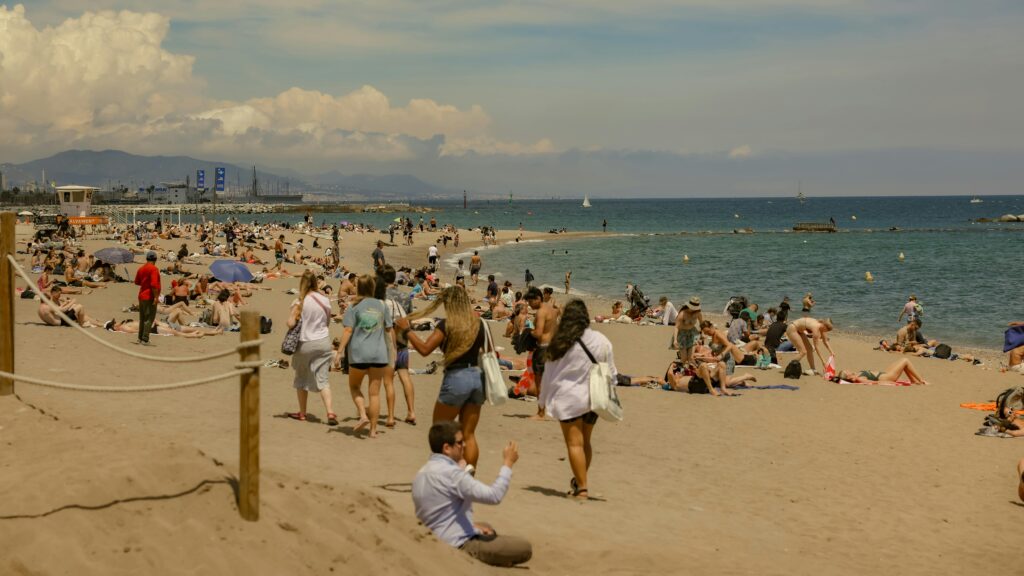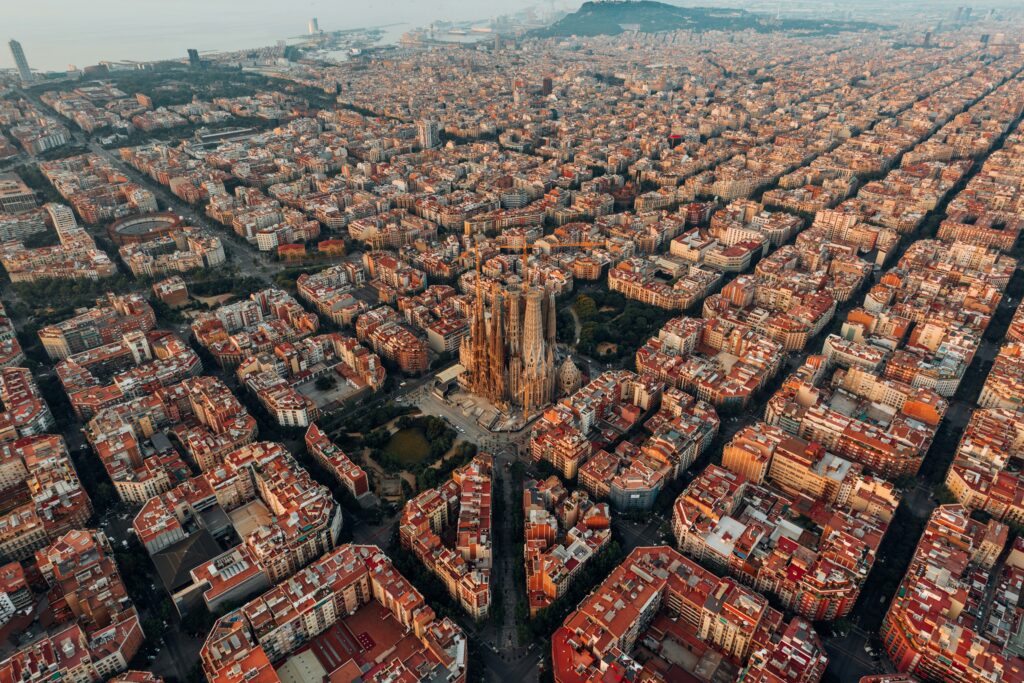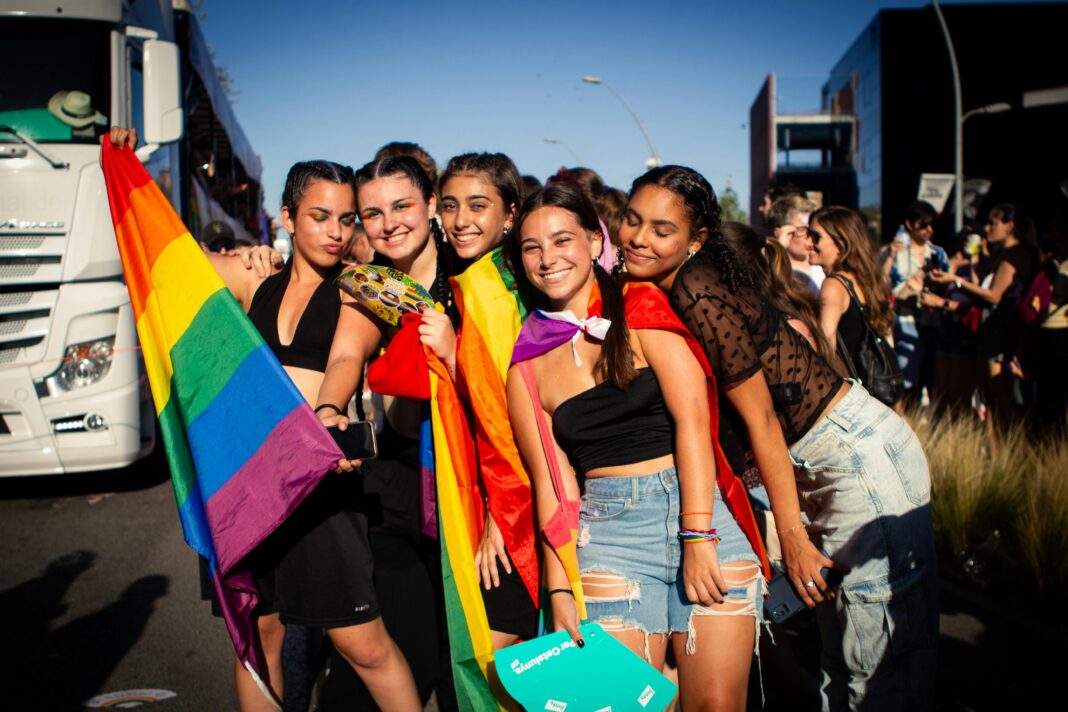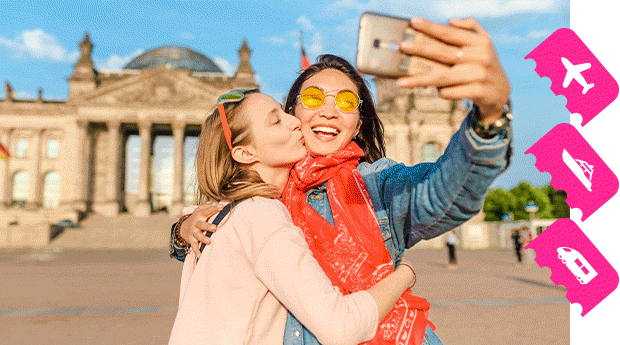Few cities feel as alive as Barcelona, Spain. Whether you’re wandering through the cobblestone streets of the Gothic Quarter, marvelling at Gaudí’s weird and wonderful Sagrada Família or soaking up the Mediterranean sun on La Barceloneta beach, you’ll never grow tired of Barna, as the locals call their beloved city.

With a metro population of about five million—one of Europe’s largest—Barcelona is a perennial favourite destination for travellers both queer and straight. The Romans, German tribes and Visigoths played their parts in the area’s early recorded history, and the city is the epicentre of Catalan culture, expressed in its unique language, cuisine and traditions—not quite French but not quite Spanish.
Beyond the landmarks, the multi-era architecture and the sound of the Catalan language, Barcelona also has a spirit of inclusion and rebellion that has nurtured its long-standing LGBTQ+ community. Spain’s first LGBTQ+ protest, held in 1977, just two years after the end of the dictatorship of Francisco Franco, happened here. More than 4,000 citizens marched down Barcelona’s famous boulevard, La Rambla, declaring that being lesbian, gay, bisexual or transexual is not a crime. The protest was a turning point for legal reforms and cemented Barcelona’s position as a leader in the fight for equality in Spain. Today that legacy continues in the city’s Pride celebrations.
Barcelona was the second Spanish city after Madrid to perform same-gender marriages after equal marriage became legal in Spain in 2005. Here, as in the rest of Spain, queer people are protected against discrimination based on sexual orientation and gender identity. In fact, Spain has some of the strongest LGBTQ+ rights in the world, including a ban on conversion therapy. Nonbinary gender recognition varies by state but is the policy in Catalunya.

On top of all the legal and political progress, Barcelona knows how to have fun. Barcelona’s nightlife is surreal and sublime. It’s not just for the boys: queer women, trans folks and nonbinary partiers will find their home here, too. Whether partaking in early evening drinks or in all-night ragers, Barna’s got the rainbow covered. Their Pride is legendary, attracting over 200,000 revellers every June. Throughout the rest of the year, drag festivals, circuit parties, queer film shows and LGBTQ+-themed exhibitions in the city’s cultural centres sustain the momentum. Barcelona’s artistic spirit manifests in its literary scene, street art and steady stream of new contemporary galleries.
Barcelona is home to Matinée Group, which throws some of the world’s biggest circuit parties—in Barcelona and elsewhere—and as well as gay fashion brands like Addicted and Boxer. Mainstream brands loved by queers, like Desigual and Zara rival Mango, also have roots here.
Start your journey in the Gothic Quarter, where centuries-old buildings house eateries, bars and boutiques, some classic, some of-the-moment. Of course, you’ll be rubbing shoulders here with pretty much every traveller who’s decided to visit Barcelona; you’ll have more breathing room if you explore the side streets, with cafés and galleries buzzing with queer art.
Then amble up to the top of La Rambla, the city’s principal boulevard, past Plaça de Catalunya and across Gran Via de les Corts Catalanes, where you’ll find yourself in the sprawling L’Eixample district, also known as Gaixample. It’s the area where you’ll find the densest concentration of LGBTQ+ venues, like queer meeting spot Punto BCN (C/ de Muntaner, 65, L’Eixample, Barcelona).
Unlike the labyrinthine Gothic Quarter, L’Eixample has a strict grid pattern with wide streets, the intersections made distinct and roomy by the octagonal angles of the neighbouring buildings. It’s a 19th-century version of modern and is home to Antoni Gaudí’s Art nouveau fever dream, Sagrada Família, which, fingers crossed, will be completed in 2026, 144 years after the first cornerstone was laid.
Head back to the waterfront via Passeig de Sant Joan, Parc de la Ciutadella, Plaça de Joan Fiveller and the city zoo to arrive at Playa de la Barceloneta, one of Europe’s busiest and most queer-friendly urban beaches. For something clothing-optional, it’s a short train ride to the highly gay resort town of Sitges, which can work as either a day trip or side trip. If that’s too far to go to find a swatch of sand where you can doff your trunks, visit Platja de la Mar Bella, which is just a 30-minute walk from Playa de la Barceloneta.
That’s been a lot of walking. How about a bite? Barcelona’s food scene is unforgettable. Tapas are king: You can’t go wrong with classics like patatas bravas (crispy potatoes with spicy sauce) or pan con tomate (crusty bread rubbed with fresh tomato). Local specialties include fideuà (noodle-based paella) and crema catalana (a creamy dessert similar to crème brûlée, but lighter and more delicate). Many restaurants, including queer-owned establishments, offer a mix of traditional and modern twists.
Barcelona is no untouched paradise. Overtourism is a pressing issue for the city, overstretching its infrastructure and affecting local communities. Consequently, Barcelona has put in place measures such as restricting hotel licences and encouraging sustainable tourism activities. Queer travellers can be responsible tourists by demonstrating sensitivity to local traditions and by staying at hotels or B&Bs owned by local LGBTQ+ folks. They can also visit neighbourhoods that are not so overrun.
Ultimately, the charm of this city does not lie in its undulating architecture or the geometric perfection of L’Eixample’s city blocks, but in its sun-kissed inhabitants and the tales they tell. Listen and learn, and your future travels will be just as lively as the Barcelonés. Here is our guide to the best of LGBTQ+ Barcelona.
Pride
Pride Bcn (June 28 to July 20, 2025). The parade takes place on the final day of Pride, running from Passeig de Lluís Companys to Gran Via de les Corts Catalanes, then west to Plaça Universitat. But that’s just the finale of more than three weeks of parties, concerts and other forms of entertainment both official and unofficial. Roughly a quarter of a million people attend—not as many as Madrid, but if they’re this good looking and eager to have a good time, who’s counting?
What to see and do
Casa Batlló (Passeig de Gràcia, 43, Barcelona). One of Antoni Gaudí’s most iconic works, this dreamy building offers a mesmerizing mix of art, architecture and history. It’s a must-visit for queer travellers drawn to unconventional beauty.
Park Güell (Carrer d’Olot, Barcelona). This surreal park, designed by Gaudí, features undulating mosaics, whimsical sculptures and sweeping views of the city.
MACBA (Museum of Contemporary Art) (Plaça dels Àngels 1, Barcelona). A hub for modern art, MACBA often hosts exhibitions by queer artists as well as events celebrating the city’s diversity.
Picasso Museum (Carrer de Montcada 15-23, Barcelona). Home to an extensive collection of Pablo Picasso’s works, this museum chronicles the artist’s creative evolution and connection to Barcelona.
Basílica de la Sagrada Família (Eixample, Barcelona). Antoni Gaudí’s career-capping masterpiece is an architectural marvel and the city’s most recognizable structure. It’s scheduled to be completed in 2026, 144 years after construction began. Get a reservation far in advance if you want to see the inside.
Mercat de la Boqueria (La Rambla 91, Barcelona). This chaotic, energizing market is packed with fresh produce, local delicacies and hidden queer curios. It’s a great spot to sample authentic Catalonian flavours on a budget.
Parc de la Ciutadella (Ciutat Vella, Barcelona). This serene, sprawling park in the heart of the city matches its classical fountains with a network of lush gardens. A prime picnic spot.
Montjuïc (Sants-Montjuïc, Barcelona). Overlooking the city, Montjuïc offers stunning views alongside museums like the Joan Miró Foundation, which often boasts queer-themed art.
Where to stay
Two Hotel Barcelona by Axel (Calabria 90-92, Barcelona). This stylish and LGBTQ+-focused hotel from the Axel group sports a rooftop pool and bar perfect for mingling. For an idea of how LGBTQ+-friendly it is, just check out their homepage. The gym décor is pink. Axel’s first Barcelona location—and its first hotel ever—is at Aribau 33, L’Eixample, Barcelona.
Cram Hotel (Carrer d’Aribau 54, Barcelona). No matter how much you’d like to cram into your visit, Cram Hotel will provide you with a relaxing homebase where you can plan it all. Plus, this explicitly queer-friendly hotel offers dramatic city views and gourmet dining. The restaurant is overseen by Michelin-starred chef Jordi Cruz.
The Hipstel (Carrer de Girona 46, Barcelona). This budget-friendly and humming hostel in L’Eixample is perfect for queer travellers seeking social connection.
Hotel Jazz (Pelai 3, Barcelona). With an outstanding location just moments from La Rambla, Hotel Jazz beckons LGBTQ+ travellers with its comfy accommodations and modernist architecture. Pool on the rooftop, jazz club on the first floor.
The Corner Hotel (Mallorca 178, Barcelona). This marvelous hotel is “just around the corner” from Gaixample. The lounge and rooftop are trendy and luxurious. There’s a rooftop bar and pool.
Hotel Brummell (Carrer Nou de la Rambla 174, Barcelona). This boutique hotel pairs a 19th-century façade with an uber-contemporary interior and an overall focus on wellness. Its exalted location in Montjuïc guarantees great views. It has the Barcelona essential: a rooftop pool.
Where to eat
La Dama (Av. Diagonal 423, Barcelona). Housed amid art nouveau splendour, this upscale restaurant is highly recommended for its cocktails and squid carbonara. It feels like a well-kept secret.
Alapar (Carrer de Lleida 5, Barcelona). Inspired by Japanese taverns (take note of the communal tables), Alapar serves up Japanese izakaya cuisine with a Mediterranean twist. Try the trout roe nigiri or crispy tapioca biscuit.
Gresca (Carrer de Provença 230, Barcelona). Known for its inventive approach to Catalonian cuisine, Gresca surprises adventurous foodies with offerings like veal sweetbreads and torrijas (Spain’s answer to French toast).
El Bosc de Les Fades (Passatge de la Banca 5, Barcelona). A magical bar with a forest theme and fairy lighting, they’ve got excellent bar food and a killer mojito. Across the way from the Museu de Cera de Barcelona (Passatge de la Banca, 7, Barcelona), that is, the wax museum, with whom El Bosc does collaborations.
Teresa Carles (Carrer de Jovellanos 2, Barcelona). The vegan paella and Catalan cheesecake are not to be missed at this homey vegetarian restaurant, which was founded in 1979 by its namesake Teresa Carles.
Flax & Kale Tallers (Carrer dels Tallers 74b, Barcelona). Founded by Jordi Barri, the offspring of Barcelona’s vegetarian trailblazer, Teresa Carles, this is a “flax”-itarian restaurant centred upon raw, plant-based, gluten-free and oily fish meals. Healthy yet indulgent.
La Cova Fumada (Carrer del Baluard 56, Barcelona). For an authentic Catalan culinary experience, come to the “smoky cave” for traditional tapas and a formidable jug of sangria. They opened in 1945—they must be doing something right.
Can Cisa/Bar Brutal (Carrer de la Princesa 14, Barcelona). Every room of this wine bar has got a different vibe, and after a few of their bold, natural wines, you’ll want to explore the décor of each one. The menu is ever-changing. Kids under 14 are discouraged.
Where to party
La Chapelle (C/ de Muntaner 67, Barcelona). A casual cocktail lounge with a chapel-inspired interior, which is to say it has lots of crucifixes and religious memorabilia. The friendly regular crowd will help start off your night right.
GinGin Gay Bar (Carrer d’Aribau 40, Barcelona). As hinted by its name, GinGin is known primarily for its cocktails. Along with its colourful décor and drag shows, its location at the heart of L’Eixample is also a plus.
Carita Bonita Bcn (Carrer de Balmes 69, Barcelona). This bar for women, particularly queer women, their favourite music and their allies is an excellent entrypoint to Barcelona’s lesbian community.
Aire Chicas (C/ Diputació 233, Barcelona). Open Fridays and Saturdays, this club for lesbians and their allies throws a great party, with pop hits from the 1980s, ’90s and the current charts.
Candy Darling (Gran Via de les Corts Catalanes 586, Barcelona). A little cozy, a little trashy, this come-one-come-all queer bar likes to throw some cabaret into the mix.
La Federica (Carrer de Salvà 3, Barcelona). A laid-back LGBTQ+ tapas bar featuring regular themed parties, live music by locals, drag shows and low-key debauchery.
Punto BCN (C/ de Muntaner 65, Barcelona). The pop music, inclusive atmosphere and expansive interior of this popular bar are why the people keep coming back. Start the evening here with cocktails and you might find yourself on the dancefloor a few hours later.
Moeem Barcelona (Carrer de Muntaner 11, Barcelona). Whether you’re down to lounge around casually or lose yourself in reggaeton, this upbeat bar makes room for both. Open every day, they’re known for their Thursday happy hour and Sunday cocktails.
Believe (Carrer de Balmes 56, Barcelona). As Cher might ask, do you believe in karaoke after a drag show? Because both are on the docket at this energetic little club.
Safari Disco (Carrer de Tarragona 141, Barcelona). This high-energy disco with all-night music and two fantastic themed floors is known for two very popular weekly gay nights. Fridays are Bananas! with pop hits and reggaeton, while Saturdays are Yass! with pop hits and house. Both crowds are hot and frisky. Owned by Grupo Arena, which also runs Punto BCN, Aire Chicas and a couple of other clubs.
Arena Xperience (Rda. de Sant Pere 21, Barcelona). Open every day from 1:30 a.m. on, this nightclub packs ’em in. The music and themes vary night to night; often there will be some sort of drag or cabaret show. By the same people who brought you Safari, Aire Chicas and Punto BCN.
The Black Room (Rambla de Catalunya 4, Barcelona). For a sweaty, half-naked good time, get your groove on at this weekly cruising party. Expect shirtless men, even when you’re not in the back room.
Barcelona has some of the biggest and most active LGBTQ+ party promoters on the planet. Whether they’re weekly, monthly or annual events, held at regular venues or in unexpected locations, these blowouts may tempt party people to plan their holidays around them. One of the biggest is Matinée Group. Throwing circuit-style parties for more than a quarter century, this promoter hosts events from Rio to London to Antwerp to Pattaya, Thailand. But it saves its best for its hometown. Matinée Easter Weekend (April 18 to 20, 2025) is usually three parties held at several Barcelona venues. Circuit Festival (August 9 to 17, 2025) is nine days of parties and other events, day and night. They also host smaller events around the city throughout the year. Expect the hottest DJs, the hottest go-go boys and lots of sweaty dancing. Packing a harness is not a bad idea. Hitting the gym for a few weeks beforehand will help you keep up with the Joneses.
Where gay and bi men can find fun
Sauna Condal (Carrer d’Espolsa-sacs 1, Barcelona). This multilevel sauna has one of Barcelona’s largest jacuzzis, fitting over 12 people. Could be fun? Leather parties twice a month, dark and naked parties twice a month.
Sauna Casanova (Carrer de Casanova 57, Barcelona) has a reputation for being one of the busiest bathhouses in Barcelona, perhaps because it’s so central in Gaixample, perhaps for the pool, hot and dry saunas, and sling room. “Supersized” men get in free every Wednesday; we presume proof must be offered. The same company owns Sauna Condal, Sauna Thermas (Carrer de la Diputació 46, Barcelona), a sauna in Valencia and a sauna in Sevilla.
Boyberry (C. de Calàbria 96, Barcelona). This busy (dare we say infamous?) cruising club attracts a young crowd with its cabins and dark rooms. It’s more of a daytime place, closing at 11 p.m., midnight on weekends. Theme nights on Tuesdays, including naked, lights out and underwear. There are locations in Madrid and Berlin, both of which serve alcohol.
Where to shop
ES Collection/Addicted (Carrer del Consell de Cent 218, Barcelona). Spain’s go-to gay fashion store for audacious swimwear and underwear, selling everything from harnesses to bottomless boxers. The ES Collection is sunny, sexy and sophisticated. Addicted is sunny, sexy and slutty. It’s a tough call.
Boxer (Carrer de la Diputació 182, Barcelona). A little darker and more fetish-y than Addicted and ES, Barcelona’s other major homegrown gay fashion brand is known for its distinctive X logo. Boxer’s affable staff will guide you to all the toys, leatherwear and fetishwear that your heart desires.
Librería Antinous (Carrer de Casanova 72, Barcelona). Founded in 1997 with the mission of increasing LGBTQ+ visibility and acceptance, this bookshop has books in Catalan, Spanish and English…and books with pretty pictures. They host readings and other events.
Nook (#3, Plaça Revolució de Setembre 1868, Barcelona). Founded by a stylish gay couple, this emporium of designer housewares, jewellery and objets d’art also hosts game nights and performances.
Flamingos Vintage Kilo (Carrer de Ferlandina 20, Barcelona). This vintage store combines a flirty, eclectic vibe with great deals and sustainable fashion. The place to buy a denim jacket emblazoned with the name of an 1980s hard rock band.
Ivori (Carrer dels Mirallers 7, Barcelona). This intimate boutique sells innovative fashion by local Catalan designers. For those who embrace their feminine side.
Holala! Plaza (Carrer de Valldonzella 6, Barcelona). The vintage selection here is so wide-ranging and delightful that you might forget to leave. They have another branch in Ibiza, so maybe you’ll find some club that your parents rocked in the 1990s.
El Corte Inglés (Plaça de Catalunya 14, Barcelona). Spain’s biggest department store chain is a handy place to buy a mobile SIM card, running shorts or a new kitchen, presuming you can fit one in your luggage.


